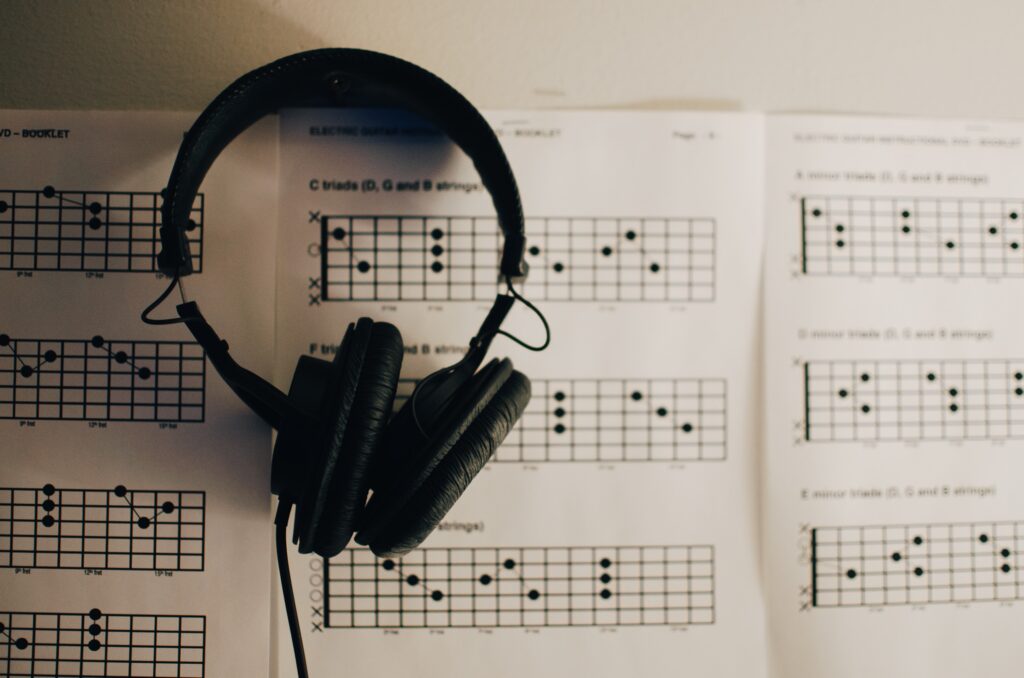Starting to play the guitar is an exciting adventure, but many people wonder how hard it is to learn.
In this guide, we’re going to answer the common question: “Is Guitar Hard to Learn?”
We’ll take a simple look at the basics, chords, and different ways of playing.
Whether you’re a complete beginner or someone who’s already strumming a bit, let’s explore together and find out how enjoyable and not-so-hard learning the guitar can be!
Why Learning The Guitar Is Difficult

Learning to play the guitar can be a rewarding journey, but it’s essential to acknowledge the challenges that beginners often face. Is guitar hard to learn? Let’s explore the reasons why mastering this instrument can be a bit tricky for some.
1. Finger Dexterity and Coordination:
One of the primary hurdles for novice guitarists is developing finger dexterity and coordination. Pressing down on the guitar strings to produce clear and resonant sounds requires a level of precision that might initially feel painfull. This challenge is particularly notable when transitioning between chords or executing complex fingerpicking patterns.
I really struggled with this at first, but after playing for a couple of weeks, you’ll develop calluses which will make it easier.
2. Initial Discomfort and Finger Pain:
As you embark on your guitar journey, you may encounter initial discomfort and finger pain. Pressing strings against the fretboard can cause temporary soreness until calluses develop on your fingertips. This discomfort is a common but manageable aspect of the learning process, and it’s a sign that your fingers are adapting to the demands of playing the guitar.
3. Learning Musical Notation and Terminology:
Understanding musical notation and guitar terminology can pose another difficulty for beginners. Learning to read sheet music, understand chord diagrams, and grasp terms like frets, scales, and intervals can be overwhelming initially. However, with consistent practice and the right resources, you can overcome this barrier.
4. Building Muscle Memory:
Mastering the guitar involves building muscle memory, which takes time and repetition. Training your fingers to navigate the fretboard smoothly and switch between chords seamlessly requires consistent practice. Patience is key as you work towards automating these movements.
5. Staying Motivated Through Plateaus:
Guitarists often encounter plateaus in their learning journey where progress seems stagnant. Overcoming these plateaus can be mentally challenging, and many beginners may feel discouraged during these phases. It’s crucial to stay motivated, set realistic goals, and celebrate small achievements along the way.
So, while learning the guitar may have its difficulties, it’s essential to view these challenges as part of the rewarding journey. Overcoming initial hurdles, building skills gradually, and staying motivated will contribute to your success as a guitarist.
Remember, the difficulty of learning the guitar is a temporary phase, and with dedication and practice, you’ll discover the joy of creating beautiful music with this versatile instrument.
Why Learning to Play Guitar Is Easy

I have played guitar since I was 8 years old and at first I really thought it was hard. It used to hurt my fingers and I wasn’t good at all. You must remember that it takes some time to get to a certain level where playing guitar becomes second nature to you. Let’s delve into why picking up this versatile instrument can be easier than you might think.
1. Abundance of Online Resources:
In the digital age, aspiring guitarists have unprecedented access to a wealth of online resources. From video tutorials to interactive apps and websites like Yousician or Simply Guitar, there are countless platforms designed to guide beginners step by step. These resources offer visual demonstrations, play-along features, and instant feedback, making the learning process more engaging and straightforward.
2. Beginner-Friendly Materials:
Guitar manufacturers and music publishers recognize the growing interest in learning the guitar, leading to the creation of beginner-friendly materials. Starter guitars are designed with playability in mind, featuring comfortable necks and lower string action to reduce finger strain. Additionally, beginner-friendly songbooks and chord charts simplify the process of learning popular songs.
3. Community Support and Collaboration:
The guitar community is known for its supportive and collaborative nature. Online forums, social media groups, and local music communities provide a platform for beginners to seek advice, share experiences, and connect with more seasoned players. This sense of community fosters a positive learning environment, making the journey enjoyable and less intimidating.
4. Versatility and Quick Progress:
The guitar’s versatility allows beginners to start playing enjoyable tunes relatively quickly. Learning basic chords and strumming patterns enables you to play a wide range of songs, contributing to a sense of accomplishment early in your learning journey. The ability to play recognizable music from the start can be a powerful motivator.
5. Flexibility in Learning Methods:
Whether you prefer structured lessons, self-teaching, or a combination of both, the flexibility in learning methods makes the guitar accessible to a diverse range of learners. Online courses (see my Best Skillshare Classes article), private lessons, and self-paced tutorials cater to individual preferences, allowing you to choose the approach that suits your learning style and schedule.
So, is guitar hard to learn? Well, learning to play the guitar is not the daunting task it’s often made out to be. With the abundance of online resources, beginner-friendly materials, a supportive community, the instrument’s versatility, and flexible learning methods, the guitar becomes an accessible and enjoyable pursuit.
How Long Does It Take to Learn Guitar?
The time it takes to learn guitar varies widely and depends on individual factors such as prior musical experience, dedication, and natural aptitude. Consistent and focused practice is crucial for progress, with noticeable improvement typically occurring over weeks and months. Setting realistic goals, breaking down the learning process into smaller milestones, and celebrating achievements contribute to a more enjoyable journey.
The type of music and playing style you aspire to master also influence the learning timeline. Some genres and techniques may require more time and effort. Quality instruction, whether through in-person lessons or online resources, significantly impacts the speed of learning. Clear and effective tutorials tailored to your skill level can accelerate your progress.
To give you an indication of what to expect when learning, I can say that if you do your best you could learn some simple songs within a few days of playing. But there is of course a difference between becoming an expert guitar player and an intermediate.
There are multiple stages in learning to master an instrument (see my ‘How Long Does It Take to Learn Piano?‘ article). This is an indication of how long it will take a beginner to reach these stages:
| Stage | Description | Practice Focus | Timeframe |
|---|---|---|---|
| Beginner | Learning basics, simple chords, and fundamental techniques | Establishing proper posture, basic chords, finger strength | 0-6 months |
| Intermediate | Mastery of additional chords, exploring various playing styles | Refining transitions, fingerstyle techniques, genres | 6 months – 1 year |
| Advanced | Honing advanced techniques, intricate solos, deeper theory | Advanced scales, improvisation, complex arrangements | 1-3 years |
| Expert | High proficiency, diverse styles, deep understanding | Ongoing refinement, exploration, potential composition | 3+ years |
Learn Guitar Chords

To answer the question ‘Is Guitar Hard to Learn?’, it’s worth looking at guitar chords. Mastering guitar chords is a fundamental step on your journey to becoming a proficient guitarist. These basic building blocks lay the foundation for countless songs across various genres. Let’s delve into the importance of learning guitar chords and some practical tips to get you started.
Why Learn Guitar Chords?
1. Foundation of Musical Expression:
Guitar chords form the backbone of most songs, providing the harmonic structure that supports melodies and lyrics. Learning chords opens the door to playing a vast array of music.
2. Versatility in Playing Styles:
Whether you’re strumming chords for a sing-along session or picking out intricate arpeggios, understanding different chord shapes enhances your versatility as a guitarist.
3. Transitioning Between Chords:
Smooth transitions between chords are crucial for playing songs seamlessly. As you learn and practice various chord progressions, you’ll develop the ability to switch between chords effortlessly.
Practical Tips for Learning Guitar Chords:
1. Start with Basic Chords:
Begin with foundational chords like C, G, D, E, and A. These chords are commonly used in many songs and provide an excellent starting point for beginners.
2. Practice Regularly:
Consistent practice is key to mastering chords. Dedicate a few minutes each day to chord practice, focusing on accuracy and clarity in your chord shapes.
3. Use Online Resources:
Take advantage of online tutorials, chord charts, and interactive apps. These resources offer visual aids, play-along features, and valuable tips to enhance your learning experience.
4. Combine Chords into Progressions:
As you become comfortable with individual chords, start combining them into progressions. This simulates the chord changes commonly found in songs and improves your overall playing proficiency.
5. Experiment with Strumming Patterns:
Explore different strumming patterns to add rhythm and dynamics to your chord playing. Experimenting with strumming variations enhances your musical expression.
6. Seek Guidance if Needed:
If you encounter challenges or have questions, consider seeking guidance from a guitar teacher or joining online communities. Feedback and advice from experienced players can accelerate your learning.
In summary, learning guitar chords is an essential step in your musical journey. As you familiarize yourself with these foundational elements, you’ll gain confidence, versatility, and the ability to play a wide range of songs. Embrace the process, practice consistently, and soon you’ll find joy in creating beautiful music through the expressive language of guitar chords.
Is an Electric Guitar Harder or Easier to Play?
When it comes to choosing between an acoustic and an electric guitar, many aspiring musicians wonder if one is inherently harder or easier to play. Let’s unravel the common perceptions surrounding the ease of playing an electric guitar.
Contrary to popular belief, an electric guitar isn’t inherently harder to play than its acoustic counterpart. The difficulty level largely depends on personal preferences, playing style, and the specific techniques you aim to master.
Electric guitars often have thinner necks, making fretboard navigation more comfortable for some players. This can be advantageous, especially for those with smaller hands or those transitioning from playing other instruments.
Also, electric guitars generally have lighter gauge strings and lower string tension compared to acoustics. This feature can make it easier for beginners to press down on the strings and execute string bends, a technique often associated with electric guitar playing.
The electric guitar’s sound is amplified electronically, which means players can achieve a powerful sound with less physical effort. This can be perceived as an advantage, particularly for those seeking a bold and dynamic presence in their playing.
Is Learning an Electric Guitar Hard?

Learning to play an electric guitar might feel a bit tricky at the beginning, especially when dealing with things like effects pedals and amplifiers. But with practice, you’ll get the hang of these electronic components.
Electric guitars are cool because they can make lots of different sounds, from smooth and melodic to loud and wild. This variety can be fun but might take some time for beginners to get used to.
Learning special moves like bending strings, tapping, and using the whammy bar might seem hard at first, but with practice, they become more familiar and not necessarily tougher than other things you’ll learn.
In conclusion, the idea that an electric guitar is harder to play is largely a misconception. The choice between an electric and acoustic guitar boils down to personal preference and the style of music you want to explore.
Both instruments have their unique characteristics, and the perceived difficulty depends on individual comfort and learning goals.
Whether you choose an electric or acoustic guitar, dedication and consistent practice remain the keys to mastering this versatile and rewarding instrument.
Best Way to Learn Guitar
Learning the guitar is an exciting journey, and finding the most effective approach can significantly impact your progress. To answer the question ‘Is guitar hard to learn?’, we have to look at the best ways to learn guitar, considering various methods that cater to different learning preferences and goals.
1. Online Lessons:
Learning guitar online is like having your own music school on the internet. You can find websites with lots of lessons and videos that guide you through the steps. The best part is you can go at your own pace, replay lessons if you need to, and fit it into your schedule. Just be sure to choose a good website with teachers who explain things well.
2. Private Lessons:
Imagine having someone just for you, helping you learn guitar. That’s what private lessons are! A guitar teacher can give you feedback, correct mistakes, and help you get better. Though it might cost a bit, having someone guide you directly can make a big difference in your learning journey.
3. Self-Teaching:
If you like doing things on your own, teaching yourself guitar is an option. You can use books, online guides, and videos. It’s a flexible way to learn, and you can go at your own speed. The key is to stay motivated, practice regularly, and don’t hesitate to seek help when you need it.
4. Combination Approach:
Why not have the best of both worlds? Combine online lessons, occasional private sessions, and self-practice. This way, you get structured lessons, personal guidance, and the freedom to explore on your own. It’s like creating your own unique path to guitar mastery.
5. Play-Along Apps and Games:
Learning guitar doesn’t always have to feel like serious work. Play-along apps and games make practicing fun. They won’t teach you everything, but they add an enjoyable twist to your learning routine. It’s like turning practice into a game!
6. Joining a Community or Group:
Learning with friends is cool! Joining a guitar community or group, either online or in your local area, lets you connect with others who share your passion. It’s a great way to swap tips, get inspired, and feel part of something bigger. While it might not give you one-on-one attention, it adds a fun social element to your guitar journey.
Should Guitar Be Your First Instrument?

Choosing the guitar as your first instrument is a good choice because it’s easy to find, not too hard to learn, and you can play lots of different types of music.
The guitar is good for playing by yourself or with friends, and you can learn the basics pretty quickly.
It also helps you understand music better, and if you want to try other instruments later, the skills you learn with the guitar can be useful.
Just make sure you like the sound of the guitar and feel comfortable holding it (that will come with time). If you do, it’s a great way to start your music adventure!
Play Most Songs With Just 4 Chords
Ever wondered how some musicians seem to play a wide range of songs effortlessly? The secret lies in the magic of four chords – C, G, Am, and F. These chords are the cornerstone of countless popular songs, making it surprisingly easy for beginners to play a variety of tunes.
The Power of Four Chords:
Many popular songs share a common chord progression, often using the chords C, G, Am, and F. This simple yet effective combination creates a foundation for an extensive repertoire.
Chord Breakdown:
1. C (C Major):
Often the starting point, the C chord is foundational and versatile. It brings a bright and clear sound to your playing.
2. G (G Major):
Adding G introduces a sense of movement and dynamism to your chord progression. It complements the C chord well.
3. Am (A Minor):
Transitioning to Am introduces a bit of emotion and variation to your playing. It’s a smooth shift from the G chord.
4. F (F Major):
Finally, the F chord brings a full circle to the progression. It has a robust sound and provides a satisfying resolution when moving back to C.
Song Examples:
Here are 5 easy songs that you can play if you just learn these 4 chords:
1. “With or Without You” by U2:
This iconic U2 song follows the C-G-Am-F progression. It’s a timeless classic with a powerful and emotive melody.
2. “No Woman, No Cry” by Bob Marley:
Bob Marley’s reggae anthem is a great choice for beginners. The song’s soothing rhythm is achieved with the C-G-Am-F chord sequence.
3. “Someone Like You” by Adele:
Adele’s soulful ballad is known for its heartfelt lyrics and beautiful melody. The song’s simplicity is highlighted by the use of C-G-Am-F.
4. “Let It Be” by The Beatles:
A Beatles classic, “Let It Be” is a great song for practicing these chords. Its comforting melody and positive message make it a timeless favorite.
5. “I’m Yours” by Jason Mraz:
Jason Mraz’s hit “I’m Yours” is not only catchy but also perfect for beginners. The song’s cheerful vibe is captured through the C-G-Am-F chord progression.
You can really start playing amazing songs by just being able to play 4 chords and switching them up. Embrace the simplicity and power of C, G, Am, and F, and you’ll find yourself playing along to a vast array of songs. Whether you’re a beginner or looking to expand your musical repertoire, these four chords serve as the keys to unlocking a world of musical versatility.
Wrap Up: Is Guitar Hard to Learn?
So, is guitar hard to learn? Not really! Learning the guitar can be lots of fun, and it’s not as tough as people might think.
We’ve seen that it’s a friendly instrument for beginners, with easy basics and the flexibility to play different kinds of music.
Don’t worry about it being too tricky – just enjoy playing and making your own music.
Remember, the guitar is here to bring joy to your musical journey, not to make things hard. So, grab your guitar, strum those chords, and let the music flow!
Frequently Asked Questions (FAQ)
1. Is guitar hard to learn?
Learning the guitar has its challenges, but it’s not inherently difficult. With consistent practice, dedication, and the right resources, anyone can learn to play the guitar.
2. How long does it take to learn the guitar?
The time it takes to learn the guitar varies for each individual. Factors such as practice consistency, prior musical experience, and personal goals all play a role. Expect noticeable progress over weeks and months.
3. What are the best ways to learn guitar chords?
Utilize online tutorials, chord charts, and interactive apps. Start with basic chords like C, G, Am, and F. Practice regularly, and consider combining methods such as online lessons and self-practice for a well-rounded approach.
4. Is an electric guitar harder to learn than an acoustic guitar?
Not necessarily. The difficulty depends on personal preference and the playing style you want to explore. Electric guitars may offer certain advantages, such as lower string tension, making them comfortable for some beginners.
5. Should the guitar be my first instrument?
Choosing the guitar as your first instrument can be a great decision. It’s accessible, versatile, and has a manageable learning curve. Consider your personal interests and comfort when making this choice.
6. Can I play many songs with just four chords?
Absolutely! The combination of C, G, Am, and F chords opens the door to playing a wide variety of songs across different genres. Many popular tunes follow this chord progression, making it an excellent starting point for beginners.
7. How can I make learning guitar fun and engaging?
Experiment with play-along apps and games, join a guitar community or group, and explore songs you love. Keeping your practice sessions enjoyable and varied will enhance your learning experience.
8. What’s the best way to start learning the guitar?
The best way to start learning the guitar depends on your preferences. Consider online lessons, private instruction, self-teaching, or a combination approach. The key is consistent practice and a genuine passion for playing.

